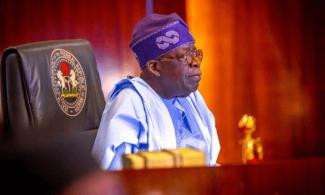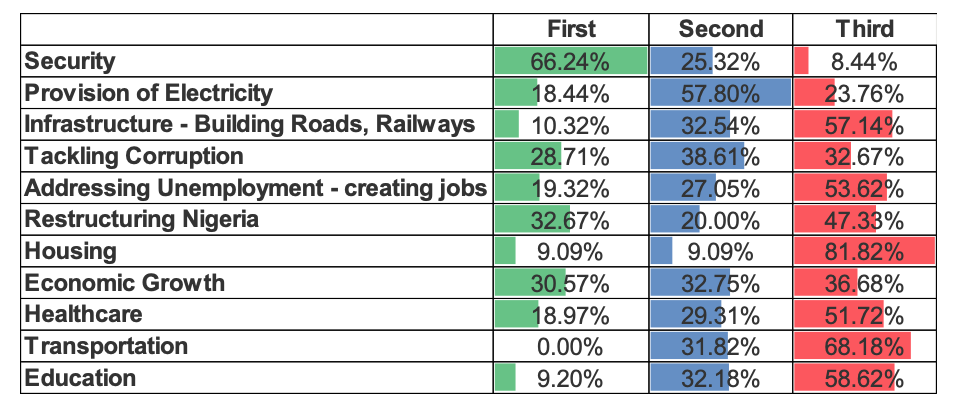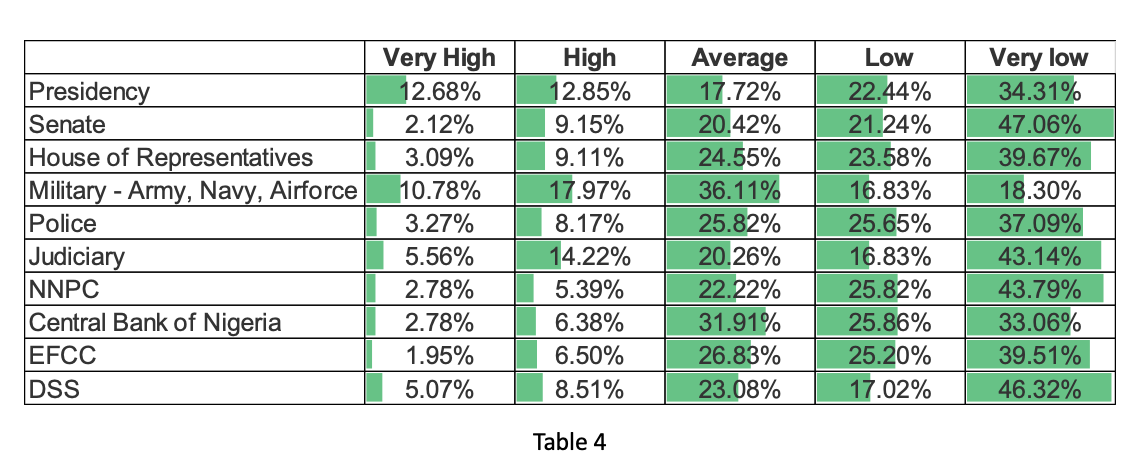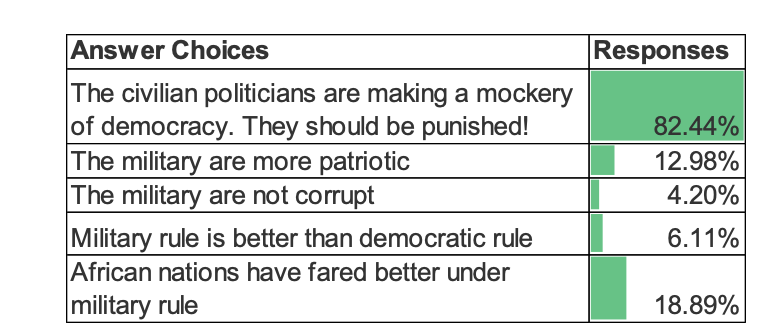
This was the third poll in GAIN’s (Governance Advancement Initiative for Nigeria) monthly presidential satisfaction and governance survey. It was administered from August 30th to September 7th. The monthly GAIN surveys comprehensively track the sentiments of the Nigerian people regarding the initiatives and policies of the Tinubu administration and are intended to provide the unadulterated views of the Nigerian public to their elected officials.
Demographic Information
The survey was targeted at Nigerians of voting age. Over 610 responses were received, providing a margin of error of ±4% at a 95% confidence level. 67.2% of respondents indicated that they voted in the 2023 presidential elections. 47.1% indicated that they had no political party affiliations. Respondents were drawn from across all six geopolitical zones, both in terms of their places of origin and their locations of residence.
41% Satisfaction rating for President Tinubu
Respondents were provided with a 5-scale question about their rating of President Tinubu’s performance (Figure 1). They were provided with the option of selecting from responses ranging from “Excellent”, “Good”, “Average” to “Poor” and “Very Poor”. Only one of these options could be selected. We have defined “Satisfaction” as being the sum of responses with a clearly positive rating of the President’s performance, drawn from the following options - “Excellent”, “Good” and “Average”.
41% of respondents rated the performance of the president as satisfactory (up from 35% in the last survey), with 9% of them rating his performance as “Excellent” (up from 8% the previous month), 15% rating it as “Good” (up from 11% the previous month) and a further 17% rating it as “Average” (slightly up from 16% the previous month).
Figure 1
Mixed Views Continue on the Administration’s New Policies
Respondents were asked to rate five (5) of the most topical policy initiatives of the Tinubu administration and were provided with a 4-scale range of response options (see Table 1). Respondents who selected the “Highly support” and “Support” scales were added up and interpreted as being supportive of the policy in question.
53.2% support Fuel subsidy removal: This was up from 50% of respondents in the last survey. 3.75% of respondents indicated that they did not know enough about the policy initiative, a slight tick downward from 4.5% the previous month.
70% support reforms in the electricity sector. A clear majority of Nigerians (70.4%) continued to indicate support for the administration’s electricity sector reforms, well in the range of the 74% who expressed support in the prior month. 16% indicated that they did not support this policy. 13.6% of respondents indicated that they did not know enough about this policy
46% of respondents oppose the new student loan policy: The new student loan policy continues to be the least supported policy initiative of the Tinubu government, with 45% of respondents indicating support. This was an uptick from the 37% of respondents indicating support in the previous month. 46.45% expressed a clear lack of support for the policy, down from 52% in the previous month. Only 8.3% of respondents indicated that they didn’t know enough about the policy, slightly up from 7.8% in the previous month.
69% support side – by – side circulation of old and new currencies: This monetary policy initiative instituted by the Tinubu administration continues to be popular with 69% of respondents expressing support for the policy.
58% support eliminating dual exchange rate: A majority continued to support the removal of the dual exchange rate policy, with the level of support rising from 52% in last month’s survey. This brings support for this policy back to levels seen in the first month of its implementation when backing was at the 60% level.
Priorities – Nigerians select Security, Electricity and Housing as their top 3 priorities

Respondents were presented with a list of ten (10) national priorities drawn from the APC manifesto as well as policy pronouncements that have been made by the Tinubu Administration (Table 2) and were asked to select their top three priorities from the list.
The first priority area selected by the majority of respondents was security at 66.2% (vs 73.33% the previous month), followed by provision of electricity in second place at 58% (vs 52.9% the previous month), while Housing was ranked third at 82%.
Respondents were also allowed to provide their own list of priorities as well as any additional commentary they had on the listed priority areas. The word cloud (see Figure 2) captures the sentiments expressed by respondents, with the size of words in the cloud, reflecting the number of times those issues were raised. The need to curb corruption and the rising school fees costs in the education sector were major issues raised by the respondents.
Figure 2: Word cloud.
Mixed Views about the Economy

We provided respondents with five statements expressing various views about the economy and they were required to select one of the options (Table 3). Three (3) of the views expressed positive sentiments, while 2 expressed negative sentiments about the economy and / or government’s plans to address job creation. Overall, 29.4% of respondents expressed positive sentiments about the economy vs 25.6% in Month 2 and 32.8% in Month 1.
The Tinubu government continues to have a lot of work to do in boosting the confidence of the Nigerian people regarding the prospects for economic growth and job creation.
Ranking Nigerian Institutions – Military continues to be the Most Respected Institution

This survey question is intended to determine the views of Nigerians about key national institutions (Table 4). Respondents were provided with ten (10) national institutions that included the Presidency, National Assembly, Military, Police, Judiciary, NNPC, CBN, EFCC and DSS and asked to select ratings from a 5-scale response set that included options ranging from “Very High”, “High” and “Average”, to “Low” and “Very Low”. Respondents were required to select one of these options for each institution.
We interpreted the sum of “Very High” and “High” ratings as being indicative of the level of respect that respondents had for the institutions that the ratings corresponded to. Using this interpretation, the three most respected Nigerian institutions are the Military at 28.75% (vs 30.3% in Month 2), Presidency at 25.5% (vs 24% in Month 2), and the Judiciary at 19.8%. We note that this last survey marked the first time the judiciary featured in the top 3 institutions in the nation. The bottom two institutions continued to be EFCC at 8.5% (vs 9.4% in Month 2) and NNPC at 8.2% (vs 7.9% in Month 2).
Sector performance ranking: Petroleum, Power and Security Continue to Rank Supreme
We ranked satisfaction with the performance of the administration across nine (9) sectors (see Table 5). We defined satisfaction as the addition of the scores on the “High” and “Medium” scale. The highest ranking by respondents continued to be in the area of the “Availability of petroleum products”, with an overall satisfaction rating of 60.8%, followed by “Power” (46%) and “Security” (42.1%). The least ranked were housing, anti-corruption and transportation respectively.
Support for Palliatives is Low
In the last survey cycle, 89% of respondents expressed opposition to the palliative relief effort. In this survey cycle we wanted to better understand the basis for that significant level of opposition and introduced a new question about the palliative program that provided a range of views about the initiative that respondents could select from (Table 6). Most of the views selected by respondents as being representative of their opinions were mostly negative. 56% of respondents believe the program would be an avenue for corruption, 46% thought it was too small to make a meaningful difference and only 2.3% reported knowing someone who had personally benefitted from the program. Only 15% of respondents thought the program was a worthy effort.
75% of respondents do not support efforts to restore democracy in Niger Republic, 82% think Coups are a punishment for bad behavior by democratic rulers
Figure 3
A majority of respondents (75%) were opposed to the planned intervention of ECOWAS in Niger Republic to restore democracy (Figure 3). To better understand the underlying reasons for this strong opposition to any sort of intervention in Niger Republic, we asked respondents to select the statements that best captured their reason for their opposition (Table 7). A large majority (82%) agreed with the view that coups were some sort of appropriate punishment for bad democratic governance. However, respondents were also very clear that they did not at all believe that the military offered more viable alternatives for national development. Only a minority were of the view that African nations fared better under military rule (18.9%), that military rule was superior to democratic rule (6.1%), that the military are not corrupt (4.2%) or that the military are more patriotic (13%).
The responses demonstrated very clearly that the corrupt and egregious behavior of politicians is the gravest threat to democracy in Africa and a major reason why citizens do not display any serious opposition to coups. The responses also reveal that the citizens are under no illusions that military rule offers any advantages over democratic government, or that the military are not corrupt or are more patriotic.

Majority adopt wait and see attitude with Ministerial appointees.
In last month’s survey a clear majority (58%) expressed disappointment with the composition of the ministerial list. In this survey cycle we asked respondents to provide us with a rating of their satisfaction with the performance of the Ministers so far (Table 8). Respondents were provided with 3 options: Satisfied (11%), Not Satisfied (21.4%) and Too early to tell (67%). Majority of respondents selected the “Too early to tell” option.
Polling Methodology
GAIN’s monthly poll is intended to gauge public sentiment about key initiatives of Government. This month’s poll tracks the initiatives rolled out in the first 90 days of the Tinubu administration. It is our intention to continue to survey the performance of government at various levels on a regular pace.
We received over 610 responses on an assumed population of 100 million eligible adult respondents, giving a margin of error of 4% at a 95% confidence level. All polling was administered via social media platforms, email and cell phones. We have demonstrated through prior polling research that these methods allow for accurate polling in Nigeria.
We believe that growth and development is enhanced in a fact based, data driven environment. Our polling insights are made available freely to citizens and governments. Additional details about the survey can be provided upon request.
Who we are.
Governance Advancement Initiative for Nigeria (GAIN) is committed to supporting the development of responsive and responsible governance in Nigeria. Our monthly governance polls are intended to provide the government with feedback on the impact of programs and initiatives while also affording able the citizenry the opportunity to have their say on the performance of those they have elected to govern them. Please send any inquiries or suggestions to [email protected].
Dr Malcolm Fabiyi